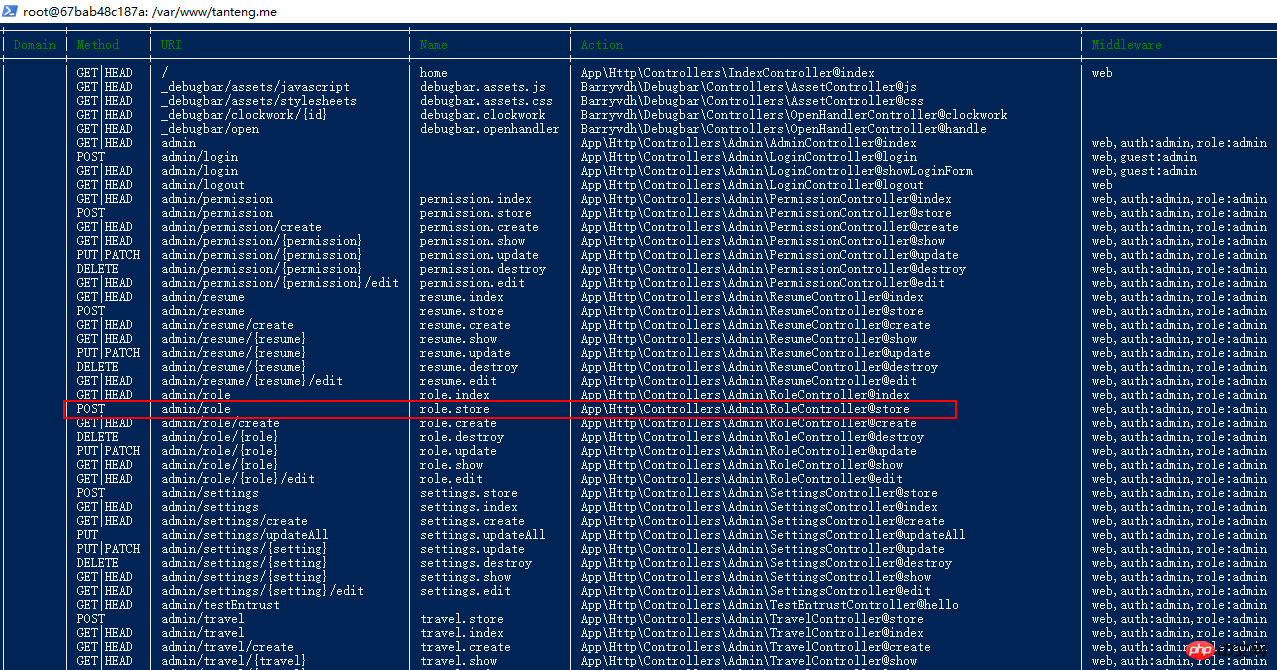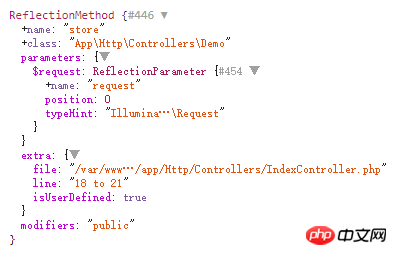Example parsing Laravel's dependency injection
As we all know, there are countless PHP frameworks. In recent years, a framework known for its elegance has gradually been known and started to be used by domestic PHPers. However, one obvious shortcoming of larave is that its document content is pitiful. . This article mainly introduces you to the relevant information on how to parse Laravel's dependency injection through source code. The article introduces it in great detail through sample code. It has certain reference learning value for everyone's study or work. I hope it can help everyone.
In the constructor or member method of Laravel's controller, dependency injection can be used through type constraints, such as:
public function store(Request $request)
{
//TODO
}The $request parameter here uses type constraints, and Request is A class:\Illuminate\Http\Request, indicating that the parameter must be this class or a subclass.
This article analyzes the source code of Laravel to see why Request can be used directly without passing in an instance in the method? It’s just that the framework automatically instantiates and passes parameters for us.
1. Route definition
Looking from the source, such a route is defined in the route definition file:
Route::resource('/role', 'Admin\RoleController');This is a resource-based route, Laravel will Automatically generate routing entries for additions, deletions, modifications and queries.

The store method at the beginning of this article is a controller method. The Action defined by the route visible in the figure is also: App\Http\Controllers\Admin\RoleController@store
Routing method analysis
Find the controller and method according to the routing definition, and execute the specific method in the dispatch method.
(File: vendor/laravel/framework/src/Illuminate/Routing/ControllerDispatcher.php)
public function dispatch(Route $route, $controller, $method)
{
$parameters = $this->resolveClassMethodDependencies(
$route->parametersWithoutNulls(), $controller, $method
);
if (method_exists($controller, 'callAction')) {
return $controller->callAction($method, $parameters);
}
return $controller->{$method}(...array_values($parameters));
}First resolveClassMethodDependencies method, "as the name suggests" is to obtain dependent objects based on the method parameters of the class, and then Then call the class method and inject the object parameters.
If there are multiple dependent objects, they will be parsed out by foreach in turn and injected as parameters.
Get the code for the dependent object example:
protected function resolveClassMethodDependencies(array $parameters, $instance, $method)
{
if (! method_exists($instance, $method)) {
return $parameters;
}
return $this->resolveMethodDependencies(
$parameters, new ReflectionMethod($instance, $method)
);
}The key point here is the use of PHP reflection. Pay attention to the RelectionMethod method. It obtains the method parameter list of the class and can know the type constraints of the parameters. Name etc.
The $instance parameter here is the RoleController controller class, and the $method parameter is the method name store.
2. Example of obtaining dependent objects
Get it from the parameters of the method Once you know the constraint type of the dependent object, you can instantiate the dependent object.
protected function transformDependency(ReflectionParameter $parameter, $parameters)
{
$class = $parameter->getClass();
// If the parameter has a type-hinted class, we will check to see if it is already in
// the list of parameters. If it is we will just skip it as it is probably a model
// binding and we do not want to mess with those; otherwise, we resolve it here.
if ($class && ! $this->alreadyInParameters($class->name, $parameters)) {
return $parameter->isDefaultValueAvailable()
? $parameter->getDefaultValue()
: $this->container->make($class->name);
}
}Obtain the object from the container based on the class name. The process of binding the object instance is first defined in the service provider.
Then pass the instantiated object into the store method, and you can use the dependent object.
3. About PHP reflection
Give an example of using ReflectionMethod.
class Demo
{
private $request;
public function store(Request $request)
{
}
}Print out the content of new ReflectionMethod(Demo::class, 'store') as shown in the figure:

A brief discussion on custom dependency injection of lumen framework
PHP implements automatic dependency injection based on reflection mechanism Detailed explanation of the method_php skills
How to use js to implement dependency injection
The above is the detailed content of Example parsing Laravel's dependency injection. For more information, please follow other related articles on the PHP Chinese website!

Hot AI Tools

Undresser.AI Undress
AI-powered app for creating realistic nude photos

AI Clothes Remover
Online AI tool for removing clothes from photos.

Undress AI Tool
Undress images for free

Clothoff.io
AI clothes remover

Video Face Swap
Swap faces in any video effortlessly with our completely free AI face swap tool!

Hot Article

Hot Tools

Notepad++7.3.1
Easy-to-use and free code editor

SublimeText3 Chinese version
Chinese version, very easy to use

Zend Studio 13.0.1
Powerful PHP integrated development environment

Dreamweaver CS6
Visual web development tools

SublimeText3 Mac version
God-level code editing software (SublimeText3)

Hot Topics
 How to implement the custom table function of clicking to add data in dcat admin?
Apr 01, 2025 am 07:09 AM
How to implement the custom table function of clicking to add data in dcat admin?
Apr 01, 2025 am 07:09 AM
How to implement the table function of custom click to add data in dcatadmin (laravel-admin) When using dcat...
 How to get the return code when email sending fails in Laravel?
Apr 01, 2025 pm 02:45 PM
How to get the return code when email sending fails in Laravel?
Apr 01, 2025 pm 02:45 PM
Method for obtaining the return code when Laravel email sending fails. When using Laravel to develop applications, you often encounter situations where you need to send verification codes. And in reality...
 Laravel Redis connection sharing: Why does the select method affect other connections?
Apr 01, 2025 am 07:45 AM
Laravel Redis connection sharing: Why does the select method affect other connections?
Apr 01, 2025 am 07:45 AM
The impact of sharing of Redis connections in Laravel framework and select methods When using Laravel framework and Redis, developers may encounter a problem: through configuration...
 Laravel multi-tenant extension stancl/tenancy: How to customize the host address of a tenant database connection?
Apr 01, 2025 am 09:09 AM
Laravel multi-tenant extension stancl/tenancy: How to customize the host address of a tenant database connection?
Apr 01, 2025 am 09:09 AM
Custom tenant database connection in Laravel multi-tenant extension package stancl/tenancy When building multi-tenant applications using Laravel multi-tenant extension package stancl/tenancy,...
 Laravel Eloquent ORM in Bangla partial model search)
Apr 08, 2025 pm 02:06 PM
Laravel Eloquent ORM in Bangla partial model search)
Apr 08, 2025 pm 02:06 PM
LaravelEloquent Model Retrieval: Easily obtaining database data EloquentORM provides a concise and easy-to-understand way to operate the database. This article will introduce various Eloquent model search techniques in detail to help you obtain data from the database efficiently. 1. Get all records. Use the all() method to get all records in the database table: useApp\Models\Post;$posts=Post::all(); This will return a collection. You can access data using foreach loop or other collection methods: foreach($postsas$post){echo$post->
 How to effectively check the validity of Redis connections in Laravel6 project?
Apr 01, 2025 pm 02:00 PM
How to effectively check the validity of Redis connections in Laravel6 project?
Apr 01, 2025 pm 02:00 PM
How to check the validity of Redis connections in Laravel6 projects is a common problem, especially when projects rely on Redis for business processing. The following is...
 Laravel Introduction Example
Apr 18, 2025 pm 12:45 PM
Laravel Introduction Example
Apr 18, 2025 pm 12:45 PM
Laravel is a PHP framework for easy building of web applications. It provides a range of powerful features including: Installation: Install the Laravel CLI globally with Composer and create applications in the project directory. Routing: Define the relationship between the URL and the handler in routes/web.php. View: Create a view in resources/views to render the application's interface. Database Integration: Provides out-of-the-box integration with databases such as MySQL and uses migration to create and modify tables. Model and Controller: The model represents the database entity and the controller processes HTTP requests.
 Laravel database migration encounters duplicate class definition: How to resolve duplicate generation of migration files and class name conflicts?
Apr 01, 2025 pm 12:21 PM
Laravel database migration encounters duplicate class definition: How to resolve duplicate generation of migration files and class name conflicts?
Apr 01, 2025 pm 12:21 PM
A problem of duplicate class definition during Laravel database migration occurs. When using the Laravel framework for database migration, developers may encounter "classes have been used...






